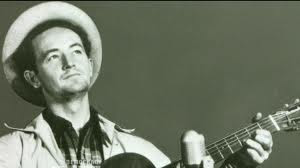 Who can say if it’s coincidence or fate that this year’s historic drought occurs on the centennial of Woody Guthrie’s birth? What’s for certain is he would have had something to say about it.
Who can say if it’s coincidence or fate that this year’s historic drought occurs on the centennial of Woody Guthrie’s birth? What’s for certain is he would have had something to say about it.
No stranger to personal hardship or a hard day of honest work, he was immensely empathetic with those who suffered in his time. And the Dust Bowl of the 1930s left a deep and lasting impression on him.
Sparked by prolonged drought that was only marginally worse than this year’s (check out this graphic for some context) and years of short-sighted land management practices, the Dust Bowl wrecked havoc on the country’s farm population. The High Plains region was hit hardest, an area that included Colorado, Kansas, Nebraska, Oklahoma, Texas and New Mexico. Homesteaders had been drawn there by rising wheat prices, extremely cheap land and the promise of some of the world’s most fertile soils hidden underneath enormous swaths of grassland. But the prairie that took millennia to form was lost in a fleeting set of growing seasons under mechanical plows and a failure to steward the soil from harvest to harvest.
By the 1930s, dust storms overtook the skies, worsening each year and moving tons upon tons of soil across the country. More than 100 million acres were depleted of precious soil, and by the middle of the decade, people left the prairie in droves, no longer able to make a living off the land. The devastation in the countryside reverberated throughout the country, which was already grappling with the Great Depression.
As the country wrestled with dynamics not at all foreign to us today – speculators, bankers, overwhelming debts, unemployment and controversial land practices – Woody was able to fashion these social and political currents into powerful, cathartic and ultimately iconic music. While he was no politician, he viewed the hardships around him as manifestations of important power inequities in the country:
“And there on the Texas plains right in the dead center of the dust bowl, with the oil boom over and the wheat blowed out and the hard-working people just stumbling about, bothered with mortgages, debts, bills, sickness, worries of every blowing kind, I seen there was plenty to make up songs about. . . Then I got a little braver and made up songs telling what I thought was wrong and how to make it right, songs that said what everybody in the country was thinking. And this has held me ever since.”
I’d be willing to bet that Woody Guthrie has inspired many, if not all, of the artists who have graced the Farm Aid stage during our 27 years, and especially our Board Artists Willie Nelson, John Mellencamp, Neil Young and Dave Matthews. They understand that the change we need in our farm system takes a nimble response to immediate crises paired with behavioral and political change rooted in a long-term vision for the country. Like Woody, they see that we’re all in this together.
But none of them have seen a drought like this year’s.
As you likely know, most of the country is enduring moderate to extreme drought, the largest area of the contiguous United States affected by such dryness in nearly 60 years. 1,584 counties in 32 states have been declared primary disaster areas. While experts don’t anticipate another dust bowl, crop forecasts are abysmal while livestock farmers struggle to feed and water their animals. The impact is deep enough to threaten thousands of farms and ranchers nationwide and jolt our food system this year and in years to come.
The whims of Mother Nature are entirely out of our control, but how we manage our land is not. With any natural disaster of this scale, we all must pitch in to provide immediate relief for those in crisis (check out Farm Aid’s Family Farm Disaster Fund to help out). But the onus is on us to craft a food and agricultural system that can be resilient in the face of disasters and that values intergenerational sustainability over short-term gain.
Said Woody’s daughter, Nora, recently about his legacy:
“My feeling is that he makes himself heard and known when he is needed, and boy, is he needed now. Everything he wrote about — political corruption, corrupt bankers, foreclosures, mentioning the environment in the dust-bowl ballads — is all in our face.”
Maybe it’s fate. Maybe it’s coincidence. But we’d be doing ourselves a huge disservice if we don’t revisit Woody Guthrie’s legacy at this historic moment and confront the challenges before our country head-on.


